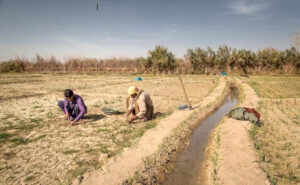KABUL (SW) – Latest findings by Salam Watandar show that Afghan youngsters who have gained professional skills alongside their education are more successful in their lives and enjoy a more sustainable economy.
Salam Watandar conducted interviews with 34 young individuals across various provinces to examine the role of professional training in the lives of educated youths.
Among the 34 young interviewees in this report, 17 have acquired professional skills in addition to their education and meet their life needs through this means. The 17 respondents who are solely educated reported facing economic difficulties due to a lack of job opportunities in their field of study and their lack of professional skills.
Banafsha, a resident of Faryab with a bachelor’s degree in midwifery and political science, says she has been unemployed for months due to the lack of job opportunities in these fields and her lack of professional skills. She adds, “I am currently unemployed and don’t know any other trade; if I had learned a skill that could help my family’s economy, it would be very good; unfortunately, I don’t know any profession.”
Mohammad Younus, who has not yet been able to learn a trade, regrets not pursuing professional training alongside his education. “I wish I had learned a profession like car repair, tailoring, or other trades so that I could earn a living for my family through that work.”
Mohammad Popal, an employee at a telecommunications company, expressed his desire to learn a profession alongside his studies. “I don’t know any trade because I was busy with my studies. When the system changed, I was unemployed for a year and couldn’t do anything, and now I am also worried because I don’t know a skills.”
Ahmad Nasir, an employee at a government agency in Kabul, said: “I have a bachelor’s degree and work in one of the departments; I haven’t learned any skills alongside my studies, and this is a concern for me because if I lose my job, I have no other source of income.”
The 17 young respondents who pursued professional training alongside their education stated that they meet their life needs through the skills they have learned due to the lack of job opportunities in their fields of study.
Mohammad Jawad, a resident of Bamiyan with a bachelor’s degree in philosophy, mentions that he learned tailoring during his student years and is currently working in that field. “While advancing my education, I also learned tailoring; since our economic situation was not good, I met my study and living expenses through tailoring.”
Nafas, a resident of Jawzjan who studied midwifery, says that due to the lack of job opportunities in this field, she contributes to her family’s economy by working in handicrafts. She adds, “I sew shawls, coats, and other handicrafts; I learned this from my mother; due to the lack of work in midwifery, I work in this field. Acquiring a profession has helped our economy.”
The results of this discussion indicate that educated youth who have acquired professional skills are more optimistic about their future compared to those who have only received education.
Mohammad Rahim, a teacher at a private school, states that he also knows tailoring and works in both fields to improve his economic situation. He adds optimistically, “When I finish school, I go to my tailoring shop; I have good income and living from both fields; if I leave my teaching job, I can meet my family’s needs through tailoring.”
Ahmad Samir, a journalism graduate, says, “I work at a media outlet and also have a tailoring business; fortunately, I have a good life; during the times I am unemployed, I go to my shop.”
The report also includes conversations with some youth currently in universityies. Eleven of these young individuals stated that they are trying to enhance their skills through professional training.
Salma Salim, a second-year chemistry student, mentions, “Alongside my studies, I am also busy with tailoring; I have been working in tailoring for five years; working in this field has positively impacted my life, and I have been able to meet my life needs.”
Farida Karimi says, “I was in my second year of university when the universities were closed; while I was a student, I also learned tailoring; now I am working as a tailor and can earn an income from it; acquiring a profession is very beneficial for anyone, whether they are educated or not.”
Sanam, a third-year law student, says that after the closure of universities for girls, she has been trying to learn a profession. She adds, “Now that I am unemployed, I am trying to learn a trade so I won’t be a burden on my family; acquiring a profession is essential for everyone, especially in conditions where job opportunities in our fields of study are scarce.”
Meanwhile, Shaker Yaqubi, an economic expert, states that by acquiring education and professional skills and working in various fields, youth can contribute to the economic growth of Afghanistan. “Learning a profession is considered one of the fundamental foundations for economic growth and development in any society; when individuals possess practical skills and expertise, they can engage in various economic activities and contribute to the production of goods and the provision of services.”
Rashid Sediqi, a sociologist, states, “An economy needs various sectors from both an academic and vocational perspective, which can play a significant role in the country’s economy; any society that can grow from these two aspects will become prosperous and successful.”
We attempted to gather the perspective of the Ministry of Labor and Social Affairs regarding providing job opportunities for youth but were unsuccessful.
Some educated youths in Afghanistan remain unemployed after graduating from universities due to a lack of job opportunities, or they turn to work in other fields.






